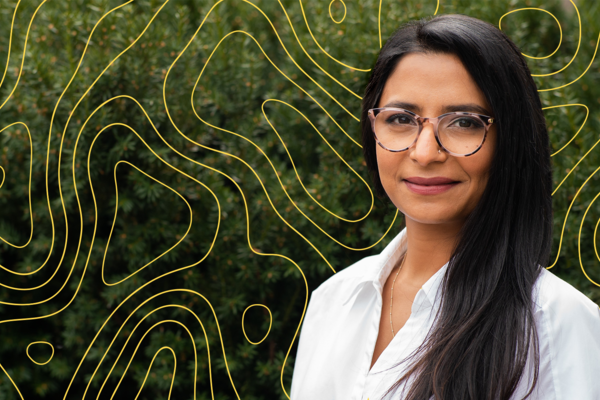
Nine stories from 2022 to boost your Waterloo alumni pride
Read our favourite forward-thinking stories from the Waterloo community

Read our favourite forward-thinking stories from the Waterloo community
By Sarah Baughan Current student, Office of Advancement co-opThe future is being shaped before our eyes – by climate change, social progress, futuristic medicine and a changing workplace.
This year, the University of Waterloo community showed they want a say in how the future is made. Here are nine stories of Waterloo innovation for the uncertain future.
UWaterloo postdoctoral researcher, Dr. Nathalia Nascomento and her team are shaping the future of healthcare for diabetes patients. Co-founded by Nathalia, OrientaMED is testing a monitor that can detect blood sugar levels by analyzing a patient’s breath. This handheld monitor carries the possibility of improving the quality of life of those living with diabetes. This revolutionary technology could hit the market as soon as 2023.

Dr Edris Madadian is pursuing ground-breaking research at UWaterloo as an AMTD postdoctoral fellow. His work explores how chemical processes can turn contaminants into biochar and bio-oil. These converted biofuels can be used as a sustainable alternative for energy. The AMTD fellowship program, funded by alumnus Calvin Choi (BA ’01) supports disruptive research that will better society – and Edris’s work certainly fits the bill.
With increasing technological advancement and shifting attitudes towards work, there’s a lot for workers and employers to prepare for. Brigette Lau (BASc ’99) is a co-founder of Firework Ventures, a firm that invests in startups with a focus on a human-centric workplace. These start-ups can help fill the skill-gap, manage worker leaves and upscale internal talent.

Thanks to Cassie Myers (BA ’18), the future of organizations can be more diverse, equitable and inclusive. Her startup Lunaria uses data management and analytics to pinpoint how organizations can improve their inclusivity while helping them remain accountable. With its start in the Grebel Peace Incubator, Lunaria is a tool that helps to address systematic oppression and promotes social progression.
Suzanne Kearns, a professor in the Faculty of Environment, dreamed of becoming a pilot since she was a teen. Now she dreams of sustainability in air transport. As a researcher in the Waterloo Institute for Sustainable Aeronautics (WISA), she works with 75 other researchers from six different universities. Together, they explore interdisciplinary solutions for sustainable aviation.

As our world is recovering from, and managing the COVID-19 pandemic, a company works with machine learning and AI to prevent and predict future pandemics. GoodLabs Studio, co-founded by alumni Thomas Lo (BMath ’94) and Riyaz Somni (BASc ’92), has created a system that detects patterns of atypical disease across a community. The startup collaborates with members of the University, across all different disciplines, in hopes to create significant impact in how policy makers and healthcare workers prevent outbreaks.
On September 22, 2022, a traditional ceremony took place between the Indigenous Peoples of UWaterloo and President and Vice-Chancellor Vivek Goel, where the University made a full commitment towards reconciliation, Indigenization and decolonization. The future of UWaterloo is one that acknowledges our part in fostering better education of Indigenous history and taking responsibility to tackle systematic oppression.

The Government of Canada has put major funding into climate research – including $200 million to the High-altitude Aerosol, Water vapor and Clouds (HAWC) mission. Dr. Chris Fletcher is a researcher with HAWC, and an associate professor in the Department of Geography and Environmental Management. HAWC is developing new satellite instruments to measure changes in the atmosphere. Launching in 2031, this technology will go on to help scientists make predictions about our world – and offers UWaterloo the opportunity to shape the next generation of climate science.
Dr Trevor Charles, a professor in the biology department, and a team of interdisciplinary researchers from UWaterloo teamed up with McGill and Vertité to create a hydroponic strawberry grower. The grower produces strawberries year-round and could help future-proof production of food in Canada. This effort is a part of the Homegrown Innovation Challenge, a $33 million initiative to future-proof sustainable food production in Canada.


Read more
Kick off National Women's History Month with seven alumni breaking barriers in STEM

Read more
Swati Matta (BCS '10) started Koble to provide new and expectant parents with credible information and support.

Read more
Meet 15 Black alumni impacting the world today, and the story behind their journeys
The University of Waterloo acknowledges that much of our work takes place on the traditional territory of the Neutral, Anishinaabeg, and Haudenosaunee peoples. Our main campus is situated on the Haldimand Tract, the land granted to the Six Nations that includes six miles on each side of the Grand River. Our active work toward reconciliation takes place across our campuses through research, learning, teaching, and community building, and is co-ordinated within the Office of Indigenous Relations.